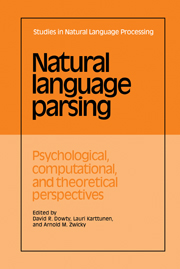Book contents
- Frontmatter
- Contents
- Contributors
- Acknowledgments
- Introduction
- 1 Measuring syntactic complexity relative to discourse context
- 2 Interpreting questions
- 3 How can grammars help parsers?
- 4 Syntactic complexity
- 5 Processing of sentences with intrasentential code switching
- 6 Tree adjoining grammars: How much context-sensitivity is required to provide reasonable structural descriptions?
- 7 Parsing in functional unification grammar
- 8 Parsing in a free word order language
- 9 A new characterization of attachment preferences
- 10 On not being led up the garden path: the use of context by the psychological syntax processor
- 11 Do listeners compute linguistic representations?
- Index
Introduction
Published online by Cambridge University Press: 25 January 2010
- Frontmatter
- Contents
- Contributors
- Acknowledgments
- Introduction
- 1 Measuring syntactic complexity relative to discourse context
- 2 Interpreting questions
- 3 How can grammars help parsers?
- 4 Syntactic complexity
- 5 Processing of sentences with intrasentential code switching
- 6 Tree adjoining grammars: How much context-sensitivity is required to provide reasonable structural descriptions?
- 7 Parsing in functional unification grammar
- 8 Parsing in a free word order language
- 9 A new characterization of attachment preferences
- 10 On not being led up the garden path: the use of context by the psychological syntax processor
- 11 Do listeners compute linguistic representations?
- Index
Summary
Parsing in traditional grammar
Like so many aspects of modern intellectual frameworks, the idea of parsing has its roots in the Classical tradition; (grammatical) analysis is the Greek-derived term, parsing (from pars orationis ‘part of speech’) the Latin-derived one. In this tradition, which extends through medieval to modern times,
parsing is an operation that human beings perform,
on bits of natural language (usually sentences, and usually in written form),
resulting in a description of those bits, this description being itself a linguistic discourse (composed of sentences in some natural language, its ordinary vocabulary augmented by technical terms);
moreover, the ability to perform this operation is a skill,
acquired through specific training or explicit practice, and not possessed by everyone in a society or to equal degrees by those who do possess it,
and this skill is used with conscious awareness that it is being used.
Parsing, in the traditional sense, is what happens when a student takes the words of a Latin sentence one by one, assigns each to a part of speech, specifies its grammatical categories, and lists the grammatical relations between words (identifying subject and various types of object for a verb, specifying the word with which some other word agrees, and so on). Parsing has a very practical function:
It is not generally realized, even in the schools, how difficult it is for anyone to control the expression and interpretation of language, and that control is as difficult to teach as it is to achieve. […]
- Type
- Chapter
- Information
- Natural Language ParsingPsychological, Computational, and Theoretical Perspectives, pp. 1 - 25Publisher: Cambridge University PressPrint publication year: 1985
- 1
- Cited by



